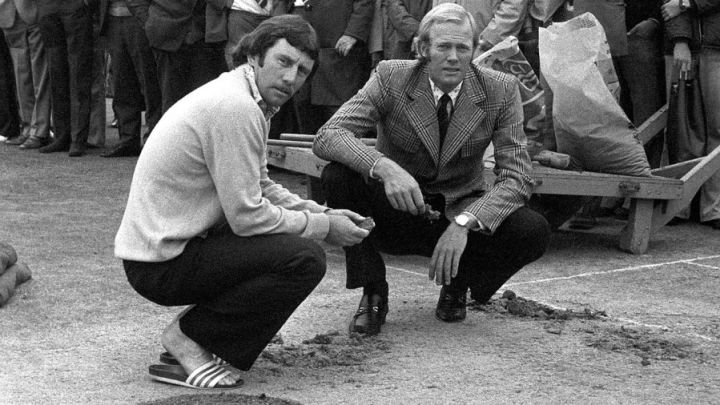That eccentric summer of '75
Looking back to the first streaker at Lord's, and perhaps the first high-profile incident of pitch vandalism

The game of cricket is constantly evolving. This week, for instance, there was a choice of vastly contrasting Test matches from three different countries, whereas 40 years ago you were lucky if the last session of a day's play was on television.
Despite the drawn match at Sabina Park, there's a greater percentage of results in the modern game. Scoring rates are up, largely influenced by the need for haste in T20 cricket, where sixes soar over shorter boundaries, propelled by booming bats. There's also less pad play, with the threat of the DRS hanging over batsmen's heads like a poised guillotine.
The game also keeps regenerating, with stars like Virat Kohli, Steven Smith, Joe Root and Kane Williamson stepping out of the shadows of retired masters. At the other end of the pitch, Mitchell Starc, Kagiso Rabada, R Ashwin and Yasir Shah are ensuring that pace and wily spinners continue to be a viable threat in the game.
However, if you want a contrast to show how cricket and society have changed drastically, turn the clock back to 1975. It was a scorching summer in England, and perhaps the season's madness can be blamed on excessive heat.
The first indication this summer was different occurred when streaker Michael Angelow painted an amusing picture at Lord's in just a pair of sneakers and socks. Having been induced by a bet, he hurdled the stumps at both ends, thankfully (for him) managing to clear the bails comfortably.
Legendary broadcaster John Arlott was in the radio booth and I can imagine him describing the aftermath in his distinctive Basingstoke brogue: "All in readiness now for the resumption of play… two balls remaining."
Where streakers are now slapped with a life ban and hefty fines at many venues, Angelow encountered a judge with a sense of humour. On hearing that Angelow had embarked on his stunt for £20, the judge said: "We'll have that then", and there was no further punishment.
Having survived a streaker at Lord's, the Australians moved on to Headingley, assuming the madness would abate in the cooler climes of Yorkshire.
We were mistaken but not before an enthralling Test match had unfolded over four days. On the penultimate evening, Australia required a further 225 runs with seven wickets in hand and opener Rick McCosker poised on 95, in sight of his first Test century.
McCosker was thwarted, not by good bowling but a pitch that was dug up and had oil spilled on it by a London East End protest group, headed by a man named Peter Chappell. The group arranged a series of protests over London cab driver George Davis' 20-year gaol sentence for armed robbery.
The match was eventually abandoned because the nature of the pitch had been irreversibly changed. The teams then travelled to London for the final Test at The Oval.
The night before the Test, my brother Greg's phone rang in his hotel room. A distinctive Cockney accent enquired: "Peet-ur Chappell here. Could I get a couple of tickets for the Test match?" Unfazed by his namesake's hijinks at Headingley, Greg replied: "Peter, I'm happy to get you tickets for the Test as long as you promise not to dig up the pitch."
Peter kept his end of the bargain but a plain-clothes policeman told me over a drink after play that some copycats had tried to get under the covers and dig up the Oval pitch the previous evening. I then asked if Davis was actually guilty and the policeman explained there was no doubt in his mind. He then added that if Davis was freed, he'd soon be back in gaol because he was a recidivist. Sure enough, Davis was set free in 1976 and two years later he was back in gaol after admitting to an armed bank robbery.
Ah, the good old days! The 1950s musical comedy about cockney spivs was spot on with the hit song "Fings Ain't Wot They Used To Be."
Former Australia captain Ian Chappell is a cricket commentator for Channel Nine, and a columnist
Read in App
Elevate your reading experience on ESPNcricinfo App.